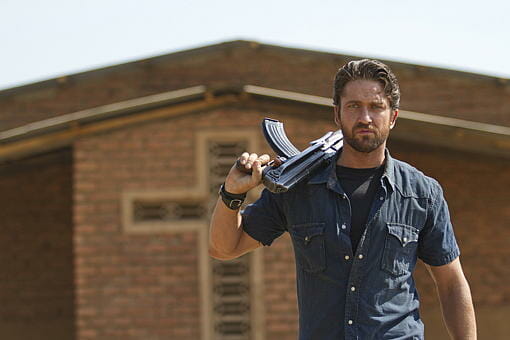Sign up for the
TSL Newsletter
and get $50 off Final Draft 12
By Meredith Alloway · October 3, 2011

This film has a killer story, and guess what, it’s true.
Sam Childers, a heroin shooting, hitchhiker stabbing, gun slinging ex-con suddenly finds Jesus. Character journey? Check. He leaves behind his wife and young daughter to build an orphanage in war torn Sudan. Dangerous situations? Check. Sam sacrifices his sanity and family to protect the innocent children of murdered Sudan citizens. Moral to the story? Check! Gerard Butler to play the hero? Big mistake. And from that colossal blunder, the movie beings to unravel, and its’ flaws begin to surface like cholera. With a weak star and an unfocused screenplay, a film can only reach so far. What’s sad about Machine Gun Preacher is that it has the best intentions, but it simply isn’t a great film.
Whenever a film documents a memoir or true story, it’s always a challenging task to remain loyal to the original story, lining up all the facts, and still make the film entertaining. Jason Keller, who wrote the screenplay, seemed to be unclear of the arc of the film and this could be due to the confusion of the arc of the main character.
Sam Childers (Gerard Butler) decides to give up his old destructive habits when his wife Lynn (Michelle Monaghan) convinces him to go to church. He’s baptized during his first visit and within months has developed his own construction company. Now out of the trailer park, and with a little more cash in his pocket, Sam decides to not only build a church in his own neighborhood, but also an orphanage and a church for the children of Sudan. He witnesses first hand the violence that the Lord’s Resistance Army has brought to Sudan and how it has left the land with roaming, helpless children. Throughout the film, Sam hops from Pennsylvania to Sudan, attempting to maintain his “normal” lifestyle back at home. After what he’s seen, how can people not donate to the cause or become a “warrior for the Lord?” He’s faced with questions about how to fight fire with fire or whether or not to fight at all.
So, you ask while noticing a tear fall into your popcorn, “How does this movie still manage to pull me in?!” It’s about the sadness of war. And not only does it illustrate the devastating ways humans harm one another, it also involves how they harm children. Destruction of innocence gets you every time.
But the film feels contrived. Maybe if Sam Childers was played by a fifty pound heavier, fifty-percent uglier actor, you wouldn’t feel it was too good to be true. Childers put his blood, sweat and tears into his mission to fight for Sudan, and Gerard Butler looks way too good to be doing it. Perhaps the arc of the film feels a little disjointed because Butler doesn’t reach the peaks and valleys in his own performance. Sure, he’s convincing as an ex-con (although we didn’t need fifteen minutes of exposition to get the point), but once he begins his mission in Sudan, and things get serious, he’s a dog with only two tricks. He can growl and foam at the mouth when he’s angry or widen his eyes, looking perplexed when he’s sad. There is a clear journey Sam Childers goes on, which involves some wonderful questions about family, violence and religion, but Butler just can’t take us on it.
“If you allow your heart to be full of hate, they have won.” This is the best moment of the film. Also one of the only times a Sudanese child speaks, or has any individual significance as a person (children as characters instead of backdrops would have been nice). He bestows wisdom to Sam, seeing that he’s struggling with many of the same demons. The title, as intended, has caused controversy. Gun and Preacher in the same sentence is like Nun and Vodka. They don’t mix. They probably…well, maybe they should mix, in moderation. At the end of the day, what is self-defense and what is violence? Machine Gun Preacher seems to find a vague answer to the tip of that iceberg. Although the film’s execution needed improvement, you have to admire the intent to tackle the iceberg in the first place. Not enough films are brave enough to confront the world’s atrocities that others ignore.